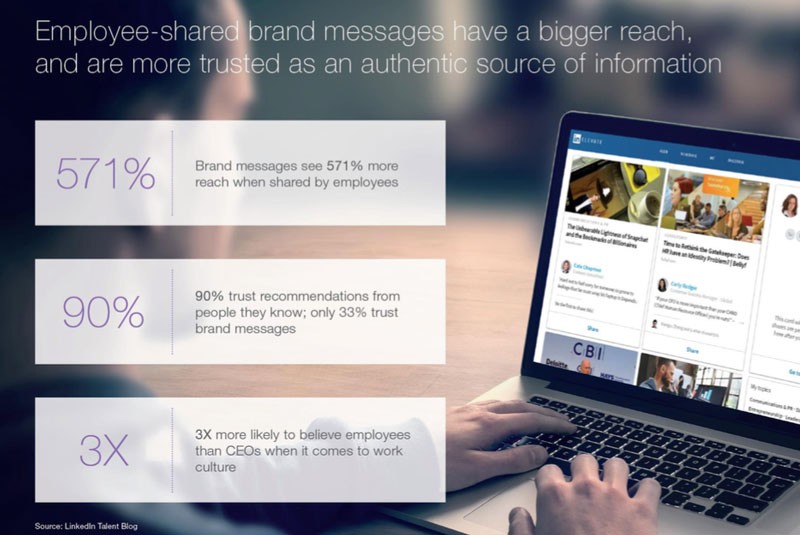The 3 Recruiting Trends That Are Quietly Reshaping Companies
Thousands of talent acquisition leaders from companies like Virgin Media, Starbucks, Netflix, and many others gathered at Talent Connect 2016 to talk about their recruiting strategies and the industry's future. While they tackled a wide variety of topics, we noticed that a few major themes kept coming up.
“The latest Talent Connect conference demonstrated how much the candidate experience is taking center stage along with employer branding,” said Frédérique Scavennec, former VP of Human Resources at L’Oreal. Other major themes included cross-functional collaboration, employee advocacy, becoming more purpose driven, and more.
While these ideas aren’t new, they continue to evolve and will remain hot topics in the years to come. Here’s closer look at three of the major themes that we believe will continue to shape talent acquisition departments across the world. You can check out all seven themes in our eBook, Talent Connect Trendbook 2017.
1. Unifying consumer and employer brands to attract top talent
We intuitively know why a strong consumer brand is important—after all, we’re surrounded by brand messages, and they influence the way we value different products and services every day. But organizations have been slower to embrace the concept of an employer brand, despite its proven impact on hiring.
However, recent data suggests that the dynamic is finally changing. Employer branding roles have increased in the last decade, and the majority of employers now consider it a key component of their HR strategy. With employer branding becoming mainstream, a new trend has emerged: unifying consumer and employer brands to voice a consistent “brand essence.”
“Companies who voice their brand essence consistently reap [the] benefits on talent acquisition and engagement,” said Nellie Peshkov, VP of Talent Acquisition at Netflix, at Talent Connect 2016.
But, this unification is easier said than done: it requires communication and cooperation between marketing, sales, and HR—departments that are often siloed.
Yet the reward is worth the effort -- not only do both departments benefit greatly in terms of increased awareness and application rates, but the company as a whole does as well — to the tune of a 35 percent increase in sales.
2. Employees becoming recruiting MVPs by acting as brand advocates and referral sources
One of the biggest trends in recruiting stems from an important truth: employee advocacy is much, much more effective for hiring than corporate messaging. Employee’s brand messages not only have a greater reach, but they’re also considered more trustworthy and authentic by candidates.
The value of employee voices is borne out by the data: an average company’s employees have 10x more connections than the brand has followers, and candidates are three times more likely to believe what employees say about employer culture than what an executive says.
Of course, employees can be more than just advocates: for companies willing to support them, employee referral program can be a huge recruiting boon. Many businesses have tried a “hiring is for everyone” strategy, training current employees to use recruiting tools and refer eligible candidates from their own networks.
The results have been stunning—and employee referrals are now the top source of quality hires across the globe (see our Global Recruiting Trends report). Referred employees also perform better and stay with their companies longer than non-referred hires.
3. Becoming more purpose-driven to gain a competitive recruiting edge
When your company has a purpose—when it connects employees to what matters to them and drives meaningful impact—your work culture becomes so much more appealing to prospective hires.
Though some businesses may struggle to attach a larger “purpose” to their work, the change can be quite simple. To create purpose at work, companies can start by focusing on:
- Clarity on how the work positively impacts others the employee cares about
- Personal and professional development for employees
- Delivery of purpose through real relationships
Purpose benefits the business, too: professionals who find their work personally meaningful perform better, stay with the company longer, and are more likely to advance to leadership positions. The end result? A better brand and stronger business results.
Recruiters can play an important role in this process by centering the employer brand and its TA messaging on the company’s impact and purpose. “If over 5 years, you’re recruiting with purpose in mind, you’ll change the business overall,” said John Phillips, Senior Vice President of Global Talent Acquisition at Starbucks.
Recruiting and talent acquisition are constantly moving forward, but it’s clear that these trends are more than just passing fancies—they’re here to stay. Consider embracing these strategies in your own work to gain a powerful competitive advantage.
To receive blog posts like this one straight in your inbox, subscribe to the blog newsletter.
Topics: Data insights
Related articles






